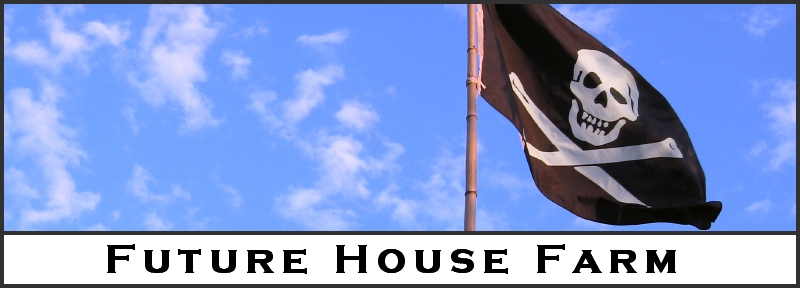01 August 2011
More to follow
I'm not sure what my title is on this project, I think I'm an advisor or something; regardless, I think it's a project worth sharing. What you're looking at is the top of a storm water storage unit that will serve as a collection space for an underground water filter/rain garden. The student running this show will have a detailed post about the rain garden when it's completed. Until then, just think of this: during any single rain storm heavier than a drizzle, we will be able to fill a 1550 gallon cistern with water that is close to potable.
When the post is ready on my other blog I'll be sure to link it here as well.
06 November 2008
Wanna see something gross?
We've gotten some pretty freaky eggs in the past, but this is one of the most memorable for sure.
I believe this atrocity was made by Peggy-O. It seems to be a tiny, miniature egg attached to a regular sized egg by a squishy little ... umbilical cord? Horrific.
20 July 2008
Blame it on the rain. Or the magnesium. Whichever.
Wow, you guys are good. After Kelly posted about our potential tomato and squash problems, you all responded with a million helpful and interesting suggestions—we even got the advice of a plant pathologist and a biologist (thanks, Taylor and Miriam!). Alan even put up a post about similar problems in his garden, along with photos that illustrate the curly leaf problem better than ours did.
After reading all your comments, and based on the weather so far this year and the general condition of the yard and garden, we're rooting for either a water issue or a magnesium deficiency. Whichever. Maybe both.
Lots of you suggested that the curly tomato leaves could be the result of irregular water, which makes sense because as I'm typing this the tomatoes are getting rained on for only the third time this year. Our rain barrels haven't been able to keep up with the drought, and so the garden has been running on minimal water. Vegmonkey probably said it best: "the tomatoes look like they need a damn good watering." Bloody right, VM.
The magnesium issue that many of you mentioned also seems about right—aside from eggshells and compost, we didn't add any amendments to the beds this year. The yellowing leaves seem to match with the photos we've found of magnesium-deficient plants, and even the basil (around the tomatoes) and the nasturtiums (around the squash) have some splotchy yellow leaves, which is definitely not typical for them in our garden.
Of course, we could still have an unfortunate disease—both of the consulted scientists mentioned mosaic virus, among others—but since there's nothing we can really do about that we decided to cross our fingers, buy some epsom salt, and give everything a damn good watering.
We didn't even know where to find epsom salt, so we wandered around the store for a while until we found this surprisingly large and cheap carton of the stuff:

And we watered it in a bit:

We watered just enough to get all of the salt dissolved into the ground because a big storm was rolling in as we were outside. Tomorrow we'll give all the plants some fresh compost and prune some more, and hopefully within the next week or so we'll see some signs of recovery. We'll keep you posted.
24 March 2008
Meg & Kelly's Eggcellent Adventure
Since we were visiting people this past weekend and everyone had eggs all over the place for Easter, we decided to loot some refrigerators and do an experiment. Or, should I say, an eggsperiment.
I conducted the eggsperiment using the steps of the highly scientific Scientific Method, as listed by Wikipedia.
Define the question:How much more kickass are our chickens' eggs than gross white store eggs or organic, free-range store eggs?
Gather information and resources (observe):
Resources: My mom stole the white egg, and we stole the organic, free-range egg from my mom. The huge egg came from our birds, obviously. Information gathered: Our chickens lay huge eggs.
Form hypothesis:
Our chicken's egg is gonna taste sooo gooood. Conversely, that white egg is gonna taste like crap.
Perform experiment and collect data:
Analyze data:
The free-range organic egg was alright. It looked basically like our eggs do, except that the yolk was pretty runny. It broke when I flipped it. The white egg was very watery and stringy. The yolk was runny, and the white part was so thin and watery that it started to smoke and get crispy as soon as I put it in the pan. It also smelled like hell. Seriously. If our chickens were to lay something that reeked like that when it was cracked open, we would have eaten the chickens by now. Ugh. Our chickens' eggs were big and bright and fluffy, as usual. They smelled fresh and nice. I didn't eat the white egg. I scrambled it up and put it on the porch for the outside cat. He didn't eat it either.
Interpret data and draw conclusions that serve as a starting point for new hypothesis:
Conclusion: Our eggs taste awesome. New hypothesis: No one should buy those crappy white eggs. Everyone should have a chicken.
Publish results:
Does this blog count?
Retest (frequently done by other scientists):
Kelly cooked himself two eggs for lunch. He said they were delicious. Original results confirmed.









